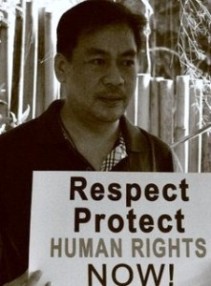This is just a pit-stop; the race is not yet won
by: Dr. Renato Mabunga
The landmark signing of an initial peace agreement between the Philippine government and the Moro Islamic Liberation Front (MILF) has reinvigorated hopes of a peaceful resolution of the decades-long conflict in Mindanao.
The framework peace deal lays the foundations for a “just peace” that should be guided by human values and international standards of good governance, human rights and the dignity of peoples and communities.
The peace deal is supposed to aim at the full development of a nation, nay of a community, guaranteed by the supreme sovereignty of the people.
What can be observed in the “framework agreement” signed by government and rebel peace negotiators this month is the truthful reference to the pains and aspirations of the people of Mindanao and its adjacent islands.
Unfortunately, only well-intentioned individuals, the wounded and those who empathize with the people of Mindanao can fully appreciate, without equivocation, the agreement. It comes out devoid of pretension and political subtlety.
People in Mindanao (and even outsiders), however, should understand that peace is not a political compromise between conflicting parties. Political compromises connote the satisfaction of vested interests of opposing camps.
Peace is a resolution of tensions perpetrated by warring parties. Negotiations should only serve a higher unifying goal. The warring groups stole peace and owe it to the people of Mindanao. Payback time should be now.
The peace process that the MILF and the government went through was a courageous show of rising above human frailties. It was an act of acceptance of the parties’ failures to the masses.
We all should also be reminded that the “framework agreement” is only a legal manifestation of intent. It is not yet “the peace agreement.”
What makes peace is making details work according to agreed principles, and the satisfaction of all requisites in restoring people to a collective dignified existence.
The peace question in Mindanao is a product of inequality. It is therefore a foremost consideration to allow the development of all people, rather than of only a particular sector, in a final peace deal.
Peace is universal. It is for all. The sufferings of the past need total healing, and to do so requires genuine empowerment of peoples and communities as active agents of society.
Autonomy for the Moro people is not enough. They need to be informed, to speak and be heard. It is not enough to grant Moro fighters an end to hostilities and relief.
What needs to be provided is a conducive, effective and lasting environment for people to self-actualize and realize their economic, social, cultural and collective rights.
The signing of the “framework agreement” is only a pit stop in a winding process of achieving peace. Continuous vigilance, peoples’ engagement and active monitoring of the progress of its implementation are demanded to ward of the devils in the details of the peace process.
(This article was first posted at UCA News website.)

Photo Source: http://opapp.gov.ph




